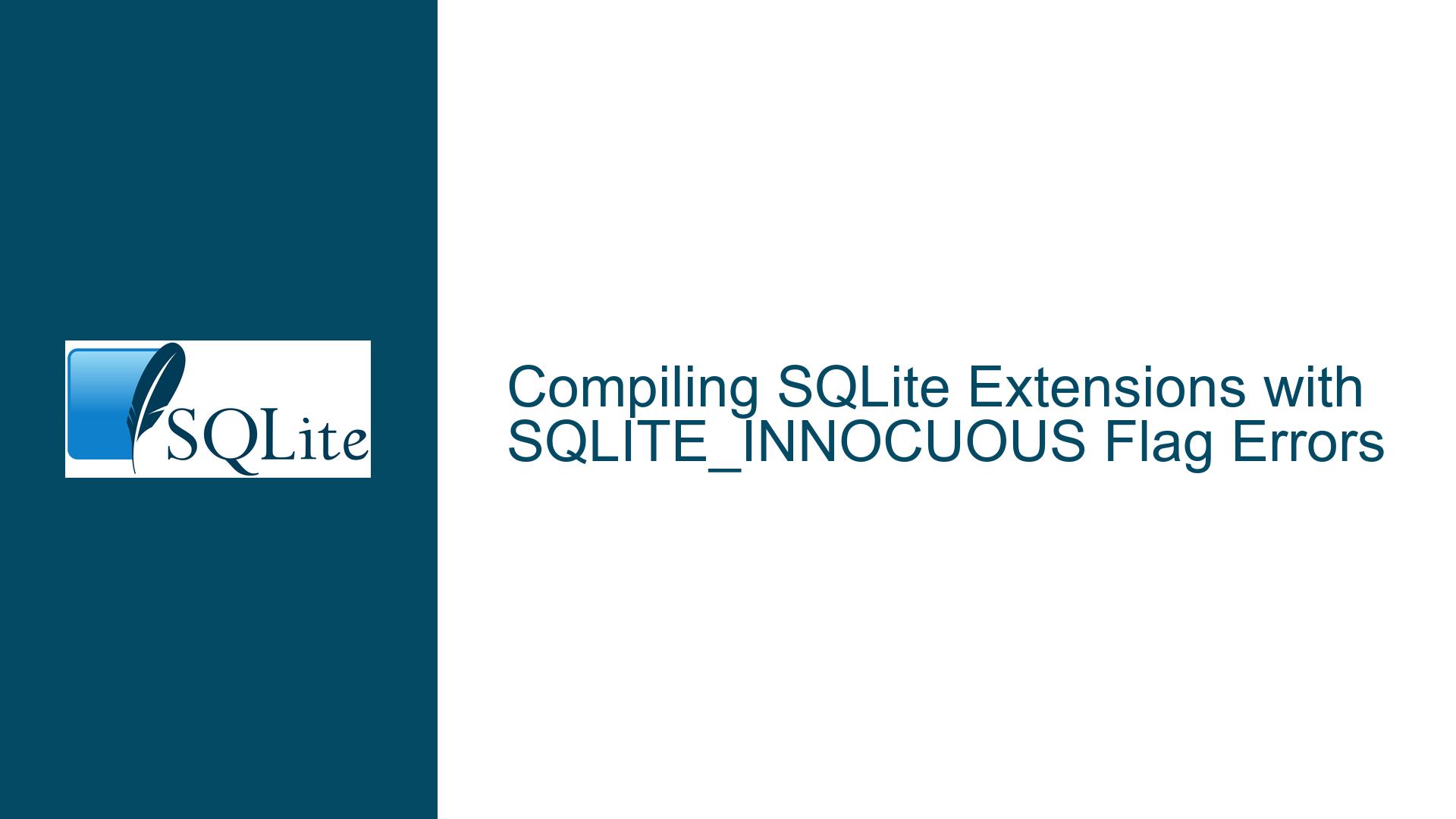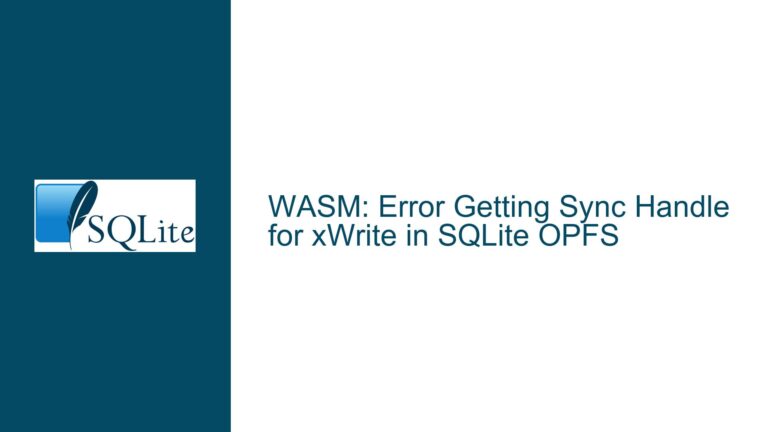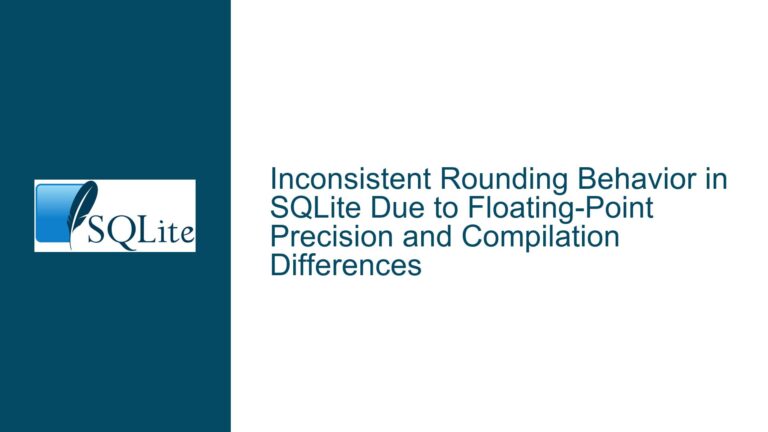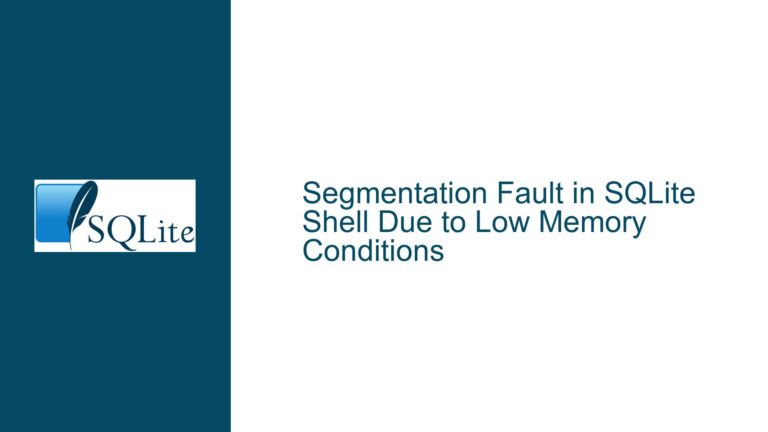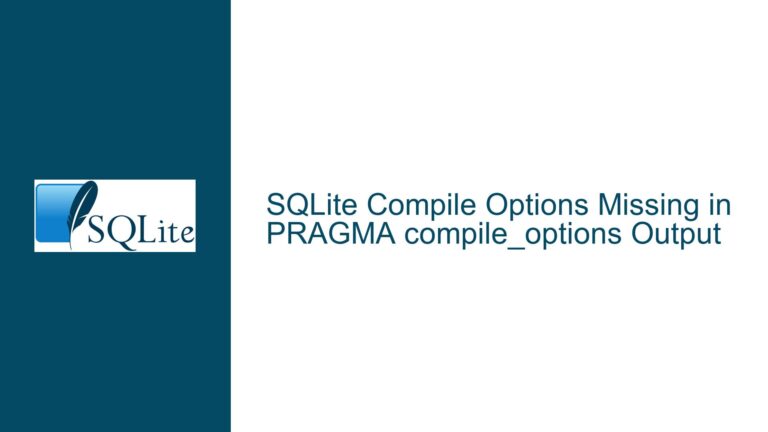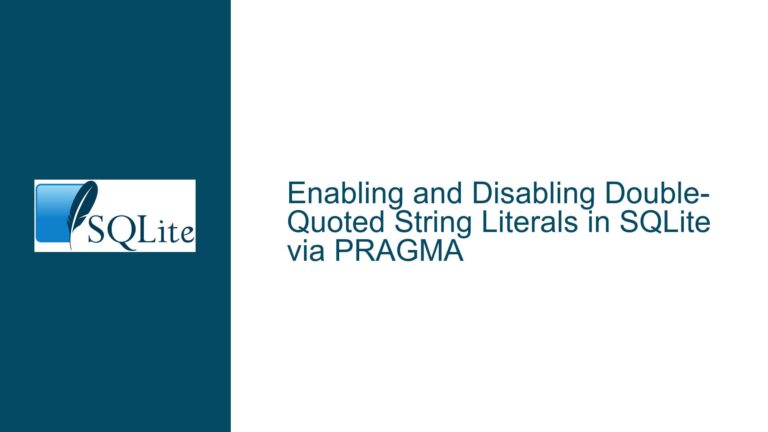Compiling SQLite Extensions with SQLITE_INNOCUOUS Flag Errors
SQLITE_INNOCUOUS Flag Compatibility Issues During Compilation
When attempting to compile the percentile.c extension for SQLite, a common error arises due to the use of the SQLITE_INNOCUOUS flag. This flag, introduced in SQLite version 3.31.0, is not recognized by older versions of the SQLite library. The error message typically appears as follows:
percentile.c:217:44: error: use of undeclared identifier 'SQLITE_INNOCUOUS'
SQLITE_UTF8|SQLITE_INNOCUOUS, 0,
^
1 error generated.
This issue is particularly prevalent when developers are working with SQLite extensions that leverage newer features but are compiling against older versions of the SQLite library. The SQLITE_INNOCUOUS flag is used to mark certain functions as "innocuous," meaning they do not access or modify the database in any way, making them safe to use in contexts where untrusted SQL might be executed. This flag is part of SQLite’s ongoing efforts to enhance security and performance.
The problem is compounded by the fact that the percentile.c extension, which is designed to calculate percentiles within SQLite, is often used in environments where the SQLite library version cannot be easily updated. This creates a scenario where developers must either update their SQLite library or find a workaround to compile the extension without encountering the SQLITE_INNOCUOUS error.
Outdated SQLite Library or Missing SQLITE_INNOCUOUS Definition
The root cause of the SQLITE_INNOCUOUS flag error lies in the version mismatch between the SQLite library being used and the version required by the percentile.c extension. The SQLITE_INNOCUOUS flag was introduced in SQLite version 3.31.0, and any attempt to compile code that uses this flag against an older version of the SQLite library will result in the aforementioned error.
In addition to the version mismatch, another potential cause is the absence of the SQLITE_INNOCUOUS definition in the SQLite header files included during the compilation process. This can occur if the header files are outdated or if the compilation environment is not correctly configured to include the necessary definitions.
The SQLITE_INNOCUOUS flag is defined in the SQLite header files as part of the function registration process. When a function is registered with SQLite, it can be marked with various flags to indicate its behavior. The SQLITE_INNOCUOUS flag is one such flag, and its absence in older versions of SQLite means that the compiler will not recognize it, leading to the error.
Updating SQLite Library or Defining SQLITE_INNOCUOUS Manually
To resolve the SQLITE_INNOCUOUS flag error, developers have two primary options: updating the SQLite library to version 3.31.0 or later, or manually defining the SQLITE_INNOCUOUS flag during compilation.
Updating the SQLite Library
The most straightforward solution is to update the SQLite library to a version that includes the SQLITE_INNOCUOUS flag. This can be done by downloading the latest version of SQLite from the official website and installing it on the system. Once the updated library is in place, the percentile.c extension can be compiled without encountering the SQLITE_INNOCUOUS error.
To update the SQLite library, follow these steps:
Download the Latest Version: Visit the SQLite download page and download the latest version of the SQLite amalgamation source code.
Extract the Source Code: Extract the downloaded archive to a directory on your system.
Compile the SQLite Library: Navigate to the directory containing the extracted source code and compile the SQLite library using the following commands:
gcc -c sqlite3.c -o sqlite3.o ar rcs libsqlite3.a sqlite3.oLink the Updated Library: When compiling the
percentile.cextension, ensure that the updated SQLite library is linked. This can be done by specifying the path to the updated library using the-Lflag:gcc -g -fPIC -dynamiclib percentile.c -o percentile.dylib -L/path/to/updated/sqlite -lsqlite3
Manually Defining SQLITE_INNOCUOUS
If updating the SQLite library is not feasible, developers can manually define the SQLITE_INNOCUOUS flag during compilation. This approach involves adding a compiler flag to define SQLITE_INNOCUOUS as 0, effectively bypassing the error. However, this is a temporary workaround and should be used with caution, as it may lead to unexpected behavior if the extension relies on the SQLITE_INNOCUOUS flag for security or performance optimizations.
To manually define SQLITE_INNOCUOUS, use the following command:
gcc -g -fPIC -DSQLITE_INNOCUOUS=0 -dynamiclib percentile.c -o percentile.dylib
This command tells the compiler to define SQLITE_INNOCUOUS as 0, allowing the compilation to proceed without errors. However, it is important to note that this workaround should only be used temporarily, and the SQLITE_INNOCUOUS flag should be properly defined by updating the SQLite library as soon as possible.
Best Practices for Compiling SQLite Extensions
To avoid issues like the SQLITE_INNOCUOUS flag error in the future, developers should follow these best practices when compiling SQLite extensions:
Check SQLite Version Compatibility: Before compiling an extension, verify that the SQLite library version is compatible with the extension’s requirements. This can be done by checking the extension’s documentation or source code for any version-specific flags or features.
Use the Latest SQLite Library: Whenever possible, use the latest version of the SQLite library to ensure compatibility with the latest features and security enhancements.
Define Flags Appropriately: If an extension requires specific flags, ensure that they are defined correctly during compilation. This may involve updating the SQLite library or manually defining the flags as needed.
Test Extensions Thoroughly: After compiling an extension, test it thoroughly to ensure that it functions as expected and does not introduce any security vulnerabilities or performance issues.
Document Compilation Steps: Document the steps required to compile the extension, including any necessary flags or library paths. This will make it easier to reproduce the compilation process in the future and avoid potential issues.
By following these best practices, developers can minimize the risk of encountering issues like the SQLITE_INNOCUOUS flag error and ensure that their SQLite extensions are compiled and function correctly.
Conclusion
The SQLITE_INNOCUOUS flag error is a common issue that arises when compiling SQLite extensions against older versions of the SQLite library. By understanding the root cause of the error and following the appropriate troubleshooting steps, developers can resolve the issue and successfully compile their extensions. Whether updating the SQLite library or manually defining the SQLITE_INNOCUOUS flag, it is important to approach the problem methodically and ensure that the final solution is both effective and secure. By adhering to best practices and staying informed about the latest developments in SQLite, developers can avoid similar issues in the future and maintain a robust and efficient database environment.
